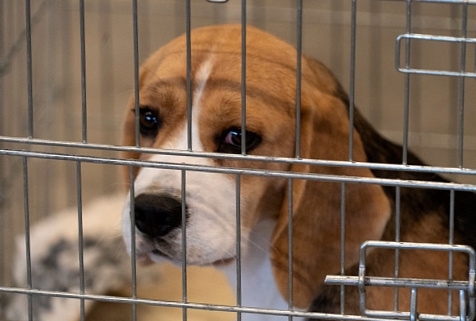An investigation published on February 2022 by the White Coat Waste Project (WCW) revealed that the National Institutes of Health (NIH) spent around $2.3 million in taxpayer’s money on research involving cruel experiments injecting cocaine to Beagle puppies.
The documents obtained under the Freedom of Information Act show that two experiments were conducted between March 2020 to March 2021 and another one in September 2020 to September 2021 on six-month-old male Beagle puppies to learn about the effects of a potential treatment for cocaine addiction.
The experiments were done by SRI International, an NIH contractor based in California, and were funded by the National Institute on Drug Abuse (NIDA), which is part of the NIH.
“Coke Hound”

The Beagles were said to be strapped in a jacket that injects a dose of cocaine together with a ‘novel drug’ to test how the two interact. A monitoring device or a telemetry unit was also surgically implanted into the dogs to measure their vital signs.
Researchers filmed the dogs throughout the duration of the experiments and were later euthanized or ‘recycled’ for other studies.
According to the 94-page report by SRI International, “the objective of the study is to evaluate the potential adverse cardiovascular effects that may result when the experimental drug and cocaine are administered together to male Beagle dogs.” The findings of the research will be published in May 2022.
The WCW said in a statement that “taxpayers should not be forced to foot the multi-million-dollar bill for wasteful and cruel ‘Coke Hound’ experiments in which Beagle puppies are injected with cocaine just to fulfill burdensome and outdated FDA red tape.”
“These dogs experienced more pain before their first birthday than any dog should have to experience in its lifetime,” they added.
The NIDA, on their part, said that the experiments were meant to find possible medical therapy for cocaine addictions and that they are committed to guaranteeing the welfare of the dogs.
“This is done for the sole purpose of ensuring that a new medication will be safe in people who are seeking treatment for cocaine use disorder and who may resume cocaine use while in treatment,” the NIDA said.
There are reportedly 20,000 deaths due to cocaine overdose in 2020 in the United States.
Animal Testing
According to People for the Ethical Treatment of Animals (PETA), there are more than 100 million animals, from dogs to monkeys and birds to rabbits, used every year for experimental purposes to test drugs, food, cosmetics, and chemicals.
Animal experiments are said to be wasteful and unreliable, and researchers found that “medical treatments developed in animals rarely translated to humans.” In most cases, the funding source for these experiments comes from the taxpayers’ money.
In 2021, the NIH was asked to explain the use of Beagles in experiments that tested drugs for certain parasite-carrying sand flies. Part of the testing involved removing the dog’s vocal cords to stop them from barking or crying.
Beagles are the most common dog breed used in animal testing because they are small and docile, making them cheaper and requiring less space in the laboratories.





